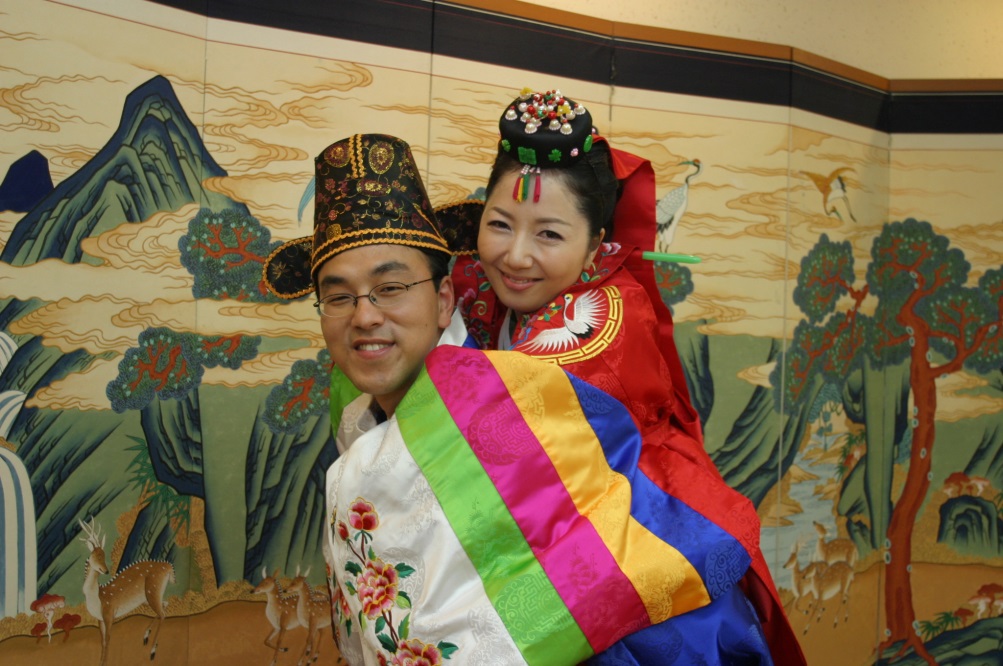Weddings are meaningful and beautiful in many countries, but besides the dress and the party, the traditions are even lovelier. Korea has many wedding traditions that are sweet and meaningful (and maybe even a little bit stressful) that the bride and groom and their respective families engage in leading up to marital bliss.
It’s Not Just About the Couple
In Korea, a marriage is not just about the couple: Marriage is about the joining of two families. According to Seoulistic, in many traditional-type marriages, an engagement is not made official until both families meet during a formal dinner. The Knot suggests the engagement dinner is also not just about families meeting, but it is also an evening of fun with gifts and possibly karaoke!
Pre-Wedding Traditions
Before the wedding, there are many traditions a bride, groom, their families, and their wedding parties may engage in in order to celebrate and prepare for the upcoming nuptials. Leading up to the wedding, gifts may be exchanged between the families and bride and groom including:
- Honsu: Household items exchanged between the bride and groom.
- Paemul and Chedan: The bride and groom exchange clothing and jewelry.
- Yedan: Close relatives of the groom receive a gift. Before, yedan used to be a gift of silk, but today, any gift sent to the groom’s family from the bride is considered yedan.
- Cholgap: The groom’s close relatives provide monetary gifts to the new bride.
- Hamgap: Gifts given to the groom’s close friends from the bride’s family. This is delivered to the bride’s house the night before the wedding. The ham is wrapped in red cloth to ward off negativity. Inside, it contains a proposal letter from the groom’s father thanking the bride’s family and is viewed as an acceptance of the marriage. There is also a gift of red and blue silk to signify unity between the bride and groom.
- Sangsu: The bride and groom’s families exchange food and wine.
Some of these practices may not be performed for every family, but they are still considered part of the wedding traditions. However, yedan and hamgap are the most important of the traditions and are still practiced today.
Another tradition many still incorporate is the exchange of a goose. Traditionally, the groom gave the bride’s mother a goose as a promise to stand beside his new wife for life since geese mate for life. Today, a live goose isn’t gifted, but a small wooden goose is given indicating the groom will take care of his wife for life.
While preparing the day of the wedding, unlike Western culture, it is not considered bad luck if the bride and groom see each other prior to the ceremony. In fact, many couples report getting ready for the ceremony together instead of apart!
Two Ceremonies?
Many Koreans choose to embrace modern times and tradition by holding a Western-style wedding and a traditional marriage.
Western-style marriages may take place in a church or a wedding hall. The bride may wear a white wedding gown, and the groom may wear a tux familiar to Western culture. Like Western practices, the groom will wait at the alter for his bride, who is escorted down the aisle by her father. A sermon about the sanctity of marriage, the couple exchanging vows and gifts, and bow to the guests wrap up the ceremony, then photos and food follow.
After the modern ceremony, the couple may hold a traditional ceremony for family. This ceremony, called the pyebaek, the couple will wear traditional hanbok. The bride may be adorned in fancy headdress and may have three red dots (chonji and gongji) on her face to ward off evil spirits and purify the bride.
The pyebaek ceremony begins with the couple bowing deeply to their families to symbolize unification. Then, the ceremony shifts to families sharing stories on how to build a strong marriage and some fun. The couple will serve families wine as they seek advice while the families throw chestnuts and dates at the bride and groom to symbolize children.
Gifts
When attending a Korean wedding, money is the typical gift to give the couple. It is expected that money will be placed in pristine white envelopes and brand new bills will be given to the new couple.
The amount of won given depends on the relationship to the bride and groom and their parents. For example, Korea for Expats states that acquaintances and colleagues of the bride and groom or their parents may be expected to give up to 50,000 won; if the bride, groom, or a parent of either works for the guest’s company, has a close work relationship, or a parent ranks high in the company, upwards of 100,000 won or more may be expected.
Dress Code
While attending a wedding, close family members to the bride and groom may be seen wearing traditional Korean outfits. Guests, oftentimes, are expected to wear business attire.
A Beautiful Spectacle
While there are some differences between Eastern and Western-style weddings, they have a few things in common: Traditions are beautiful, family is meaningful, and ceremonies should be rich and lovely. Perhaps you will be able to experience a Korean wedding one day to see for yourself!
—- Joelle Halon

